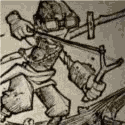|
DarkAvenger211 posted:Ah ok. That sounds pretty good to me. I don't suppose there's any decent examples of how a usual session goes? If anyone knows of any good videos of a group playing through one that might give me some ideas as well as maybe how to introduce people to the idea. The Atomic Robo book has a lot of play examples as comic book pages, which is pretty cool. The main thing you have to keep in mind is that, where D&D tries very hard to be like a video game, with like clearly defined rules about distance a distinct time scale, FATE is very wishy-washy about that stuff and tries to be more like a book or TV show. NPCs are also kind of an abstract concept. An NPC that isn't powerful or important enough to have narrative agency is, basically, furniture. So, in D&D, the rogue might have to take several actions to sneak across a guarded courtyard, risking discovery each time because they can only cross 1/4 of the distance per action. In FATE, a similar character would describe the way that they plan to sneak past the guards, what route they'd like to take, and stuff, and then you would make a single Stealth check as an "Overcome" to see how that pans out, with the ranges being "success", "success with a minor cost", "success with a major cost" or "failure", and then the players and GM sort of collaborate to decide what constitutes a minor cost or whatever for this course of action.
|
|
|
|

|
| # ? Jun 8, 2024 20:34 |
|
Are there any good examples of Consequences you'd take from being attacked? And how do these work mechanically (Are they just for narrative purpose?) Do you only take consequences when being attacked? Or can you take consequences as a result of failing to overcome something. In that case would you just assign an appropriate negative aspect to the player? Are compels only for player's aspects? Or could one reasonably come up on a situational/environmental aspect. Just trying to wrap my head around the more mechanical parts of the game. I realize I can just do what I want for a game I'm running. Whatever's the most fun, but really I do like to stick to some kind of system.
|
|
|
|
DarkAvenger211 posted:Are there any good examples of Consequences you'd take from being attacked? And how do these work mechanically (Are they just for narrative purpose?) Mild: Bruised, Messy Hair, Torn Clothes, Sprained Ankle, Freaking Out, Just Peed a Little, Out Of Breath Moderate: Covered In Blood, Concussion, A Few Broken Ribs, Badly Burnt, Just Got Served Severe: Broken Arm, Nearly Mad With Grief And Rage, There's poo poo All Over The Place...Oh God Some Of Its In My Mouth!, Consequences are essentially temporary Aspects which can be triggered by your opponents (and the opponent who gave it to you gets to do it for free once). Consequences are, by their nature, negative and if you build up enough it's easy for an opponent to (at the cost of a few fate points) totally overwhelm you. quote:Do you only take consequences when being attacked? Or can you take consequences as a result of failing to overcome something. In that case would you just assign an appropriate negative aspect to the player? Are compels only for player's aspects? Or could one reasonably come up on a situational/environmental aspect. You only take consequences when you're reducing Stress, and you only take Stress from an attack. However, an "attack" doesn't necessarily have to mean getting punched in the face. The conflict rules model things like running a race, verbal sparring, evading a search, etc. One of the rules of the system is the "Fate Fractal", which means that you can use all, or part, of the character rules to represent everything in the game as a character
|
|
|
|
oriongates posted:You only take consequences when you're reducing Stress, and you only take Stress from an attack. However, an "attack" doesn't necessarily have to mean getting punched in the face. The conflict rules model things like running a race, verbal sparring, evading a search, etc. Addendum: Sometimes a consequence can be assigned as the result of a "Succeed with minor/major cost" result, but it's kind of the lazy way out. Those are usually better served by tagging new Aspects onto the current Situation, or by just agreeing that a certain suboptimal thing is definitely going to happen to your character/the party.
|
|
|
|
So should I only try to create Aspects that actively hinder/help? Do aspects only really exist to be invoked using fate points are they also supposed to be used as a passive bonus/negative modifier?
|
|
|
|
DarkAvenger211 posted:So should I only try to create Aspects that actively hinder/help? Do aspects only really exist to be invoked using fate points are they also supposed to be used as a passive bonus/negative modifier? That said: the thing about aspects is that aspects are always true; i.e., if someone is a "Member of the Order of Whatever", then they're a member of the Order of Whatever and that's always the case. However, in order to really take advantage of that fact (in mechanical terms, getting a +2 or a reroll), that's when you have to spend a Fate point. When you do that, what you're doing is making the aspect directly relevant to what's happening in the fiction. And yes, when creating aspects you need to think about how it can help you out in a situation and/or can get compelled so you can get Fate points. Aspects that do neither are pretty much useless.
|
|
|
|
DarkAvenger211 posted:So should I only try to create Aspects that actively hinder/help? Do aspects only really exist to be invoked using fate points are they also supposed to be used as a passive bonus/negative modifier? Help/hinder might be a bit narrow...but Aspects are things that should be used. An Aspect like "Weird Birthmark On My Left Thigh" isn't going to be used in any significant way. It's certainly a fact about your character, but unless you decide it's shape or placement has some kind of significance for the setting then you probably won't be invoking it. However, an aspect like "Birthmark Of Lost Royal Bloodline" is definitely one that is open to being used, both positively and negatively. It might be used for you to impress someone, convince someone of your identity/importance. It might be used against you by being revealed at an inopportune time, drawing attention to you, etc. There are generally two "classes" of Aspects in FATE. There's "set" Aspects like the Aspects on your character sheet (or an NPCs) and Aspects that are important to a location/scene (like a city having the "Crowded Streets" Aspect). These Aspects should be designed to be interesting and often there should be a mix of useful (activated by spending a fate point) and complicating (which give you fate points), many aspects will be both. Then there are "Created/Discovered" Aspects which you make via Boosts or the Create An Advantage action. These Aspects are typically temporary (although not always) and are more tactical, since you are creating them on the spot they're usually intended to help you or hinder your enemies. Since you get a free invoke on these aspects and you can "stack" them with other aspects they're typically used to build up a few then hit the opponent with a big "finisher" invoking several at once.
|
|
|
|
Ah ok. And Compels can come from any aspect? Not just player aspects? Can players compel NPCs? Or other players?
|
|
|
|
DarkAvenger211 posted:Can players compel NPCs? Or other players? Yep! In those cases the player spends the fate point and whoever is being compelled (either the player's PC or the GM) receives it.
|
|
|
|
DarkAvenger211 posted:Ah ok. And Compels can come from any aspect? Not just player aspects? Yep. I gave the example above of "Crowded Streets" as an environmental aspect for a city. A Compel in that situation would "someone bumped into me and I dropped the X" or "some pickpocket slipped off with my coin purse" as a compel. quote:Can players compel NPCs? Or other players? Yeah, here's how it breaks down. *Players can compel themselves. This is basically them suggesting "hey, here's an interesting complication related to X Aspect", essentially asking the GM for a fate point in exchange for a "hook". *Players can compel NPCs. This involves them spending a fate point in order to use an Aspect negatively against someone, in a non-mechanical way (i.e. an in-game event rather than a re-roll or +2 bonus). *Players can, in theory, compel PCs as well. But unless you're in a PvP situation it would be bad form to do this to a teammate...although nothing says you can't suggest an interesting compel and the other PC decide to roll with it (and as a bonus that route doesn't cost you a Fate Point). *The GM can compel Players, offering to give them a Fate Point to accept a complication. If the player declines, they must spend a Fate point instead. Compels like this are non-mandatory. *The GM can compel NPCs. This adds a Fate Point to the per-scene pool of Fate Points GMs have for NPCs. Ultimately, all compels are subject to GM veto, even if they make sense for the Aspect (unlike Invocations, where the GM is deciding whether or not the aspect would apply). This should generally only happen if the Compel conflicts with your "behind-the-scenes" knowledge. For instance, the players might attempt to use a compel to have the city guard arrive at an inopportune time...but the GM knows that the city guard is being bribed to stay out of this part of town or even that there is no city guard and the place is effectively lawless (but the PCs aren't aware just having arrived). And even in cases where it does contradict your established facts, always consider the possibility that it might be more interesting to say yes and see what happens.
|
|
|
|
This is good stuff. How about during a conflict when players cause an NPC to need to take a consequence, are they the ones that decide what it is? Or is it the GM?
|
|
|
|
The player gets to create the consequence.
|
|
|
|
Still kinda reading through the Core book. There's a scene example they explain goes like this:quote:Let’s look at our example scenes above. The prompts don’t specify In this example, he get's a compel due to one of his player aspects. The compel seems to suggest he's being ambushed without his stuff. Is this just narrative fluff added to the scene? Or will something mechanically arise because of it? Would he temporarily be given an Unarmed aspect? If he is then it would be an aspect that could be taken advantage of only with the use of fate points? Since technically the player can do whatever he wants based on his rolls and skills, there doesn't seem to be any rules for actually having equipment since it's assumed the players have what they need.
|
|
|
|
I don't have the book in front of me so I can't check if there's further context but that example is probably not as clear as it should have been on the mechanics behind the compel. Likely the GM is compelling some Aspect that Ryan's character has that would be helpful (something like "Arcane Sanctum" or "Array Of Magical Weapons"), basically establishing that the resources needed to invoke that Aspect are not currently around and thus (without changing the scenario in some way), Ryan would not be able to invoke that Aspect. Here's a clearer example using a very dull Aspect "A Sword", belonging to Fight Guy. Now, this means that Fight Guy owns a sword and can invoke this Aspect in situations where having a sword would be helpful to get a bonus (+2 to a roll or a reroll). Now, lets say the GM posed a similar question and Fight Guy said he was taking a bath, the GM offers a compel to say he doesn't have his sword with him. If Fight Guy accepts that Fate Point then we've established, as a fact for the scene, that he does not have his sword, and so he cannot Invoke it to add any bonus to his rolls (at least not without putting in some effort to get to wherever his sword is). If Fight Guy rejects the compel (spending a Fate Point) it would be something more like, "no, of course I've got it right by my bath. Don't want someone to steal it after all.", establishing as a fact that the sword is with him and thus available to be invoked. This can be offered by the player as well. Say a fight breaks out, and Fight Guy is low on Fate Points he could ask for a compel "wouldn't you know it, I left my sword behind!" and if the GM accepts then the sword isn't there. It can also be done retroactively (say Fight Guy goes to a place where swords aren't allowed and something happens where the lack of his sword is a problem, that would be a retroactive compel).
|
|
|
|
DarkAvenger211 posted:Still kinda reading through the Core book. There's a scene example they explain goes like this: It's the latter one, but it's a much stronger aspect than Unarmed probably, because his stuff is, at minimum, back in the changing room, if not back at his house or something. Basically, accepting the Fate Token from a compel is an agreement between the GM and player to accept a hardship or disadvantage for the sake of a more interesting narrative. This is important because, under normal circumstances, a character is assumed to have all the equipment necessary to use their skills, stunts, and aspects to their full extent. By stating that, temporarily, that is not the case, then the narrative options for that character change. So, lacking your magic wand doesn't make you lose your Shoot skill, but it means that a Shoot attack in this bathhouse means like, throwing a bucket at somebody, and therefore you can't stack on your stunts and aspects that relate to casting a spell at somebody.
|
|
|
|
Ah ok. This makes a bit more sense then. The stunts example especially since most stunts seem to require some specific circumstance to be able to use.
|
|
|
|
So I have a question sort of related to a the Unarmed aspect I mentioned earlier. During a conflict, say the players are in a gunfight and I have an NPC create an advantage to Disarm a player. That player now has a disarmed aspect associated to him at the moment. Would it be a compel to the player to tell him he can't use his shoot skill right now because of the disarmed aspect? Or would it be implied that since there's nothing else available for him to shoot with because of the aspect. In this case he could use an action to try and remove that situation aspect (by retrieving his gun while under fire for example). Does this advantage only exist to provide a free invocation by an NPC (NPC get's +2 to dodge your shoot attack because you're disarmed so it's harder to shoot you now?) That's the first question, the second one is kind of tied to it as well. If a player tries to create an advantage/remove an aspect during a conflict by using his character skills, what exactly happens mechanically on a failure? Or a success with cost? Would the costs be damage on the stress track? Would it be aspects/boosts with invocations. In the above example, lets say the player tries to use Athletics to retrieve his gun against some passive opposition due to the gunfight. If he rolls under the amount required then it's either a failure, or a success with major cost. If he ties it's a success with minor cost. The cost in this case is a little ambiguous to me (for good reason, I'm trying to get a good set of examples setup so I can relate their severity to what might go on in the game I'm planning)
|
|
|
|
DarkAvenger211 posted:So I have a question sort of related to a the Unarmed aspect I mentioned earlier. Having the aspect "Disarmed" applied to a PC is enough to say they aren't going to use the Shoot skill until they find a way to get rid of the aspect with an Overcome action, because the current fiction says "Officer Stevedave doesn't have his gun." This is the kind of aspect that's weird to compel, and that's fine, not everything needs to get compelled. This aspect would make more sense being invoked by opposing NPCs to prevent Stevedave from creating an advantage like "Got The High Ground" based on the idea that the Disarmed aspect can be invoked to keep the disarmed PC pinned down with suppressing fire. However, even if it's not being invoked by anyone, Officer Stevedave still doesn't have a gun, so he can't shoot a gun until he fixes it. quote:In the above example, lets say the player tries to use Athletics to retrieve his gun against some passive opposition due to the gunfight. If he rolls under the amount required then it's either a failure, or a success with major cost. If he ties it's a success with minor cost. The cost in this case is a little ambiguous to me (for good reason, I'm trying to get a good set of examples setup so I can relate their severity to what might go on in the game I'm planning) Why is this passive opposition? People are shooting at him, that's pretty dang active.
|
|
|
|
Also, don't forget that not everything is an aspect. It can be enough to say that the character dropped their gun, and as such can't use their Shoot skill until they take an action to grab it again (since you can't use the Shoot skill without something to fire).
|
|
|
|
DarkAvenger211 posted:So I have a question sort of related to a the Unarmed aspect I mentioned earlier. It would be a compel to simply "lock out" the Shooting skill. A more standard invocation (+2/reroll) would be something like if the player has to pull out a smaller, backup weapon (mechanically the two weapons are equivalent but it can be assumed that whipping out the second gun slows him down or perhaps he has to grab a gun off the ground, etc. Both are potentially possible but are going to be very situational. quote:That's the first question, the second one is kind of tied to it as well. If a player tries to create an advantage/remove an aspect during a conflict by using his character skills, what exactly happens mechanically on a failure? Or a success with cost? Would the costs be damage on the stress track? Would it be aspects/boosts with invocations. In the above example, lets say the player tries to use Athletics to retrieve his gun against some passive opposition due to the gunfight. If he rolls under the amount required then it's either a failure, or a success with major cost. If he ties it's a success with minor cost. The cost in this case is a little ambiguous to me (for good reason, I'm trying to get a good set of examples setup so I can relate their severity to what might go on in the game I'm planning) The actions provide examples of failure results: https://fate-srd.com/fate-core/four-actions#create-an-advantage Basically either you just don't succeed (and no new aspect is made) or you make a new aspect but an opponent gets the free invocation (although you can still spend fate points to invoke to your advantage). For instance, say you try and disarm an opponent but fail...you might still disarm them, but it throws you off and your opponent invokes it to slug you in the face.
|
|
|
|
Erg. I see there's two different answers on whether or not it would be considered a compel. That's fine too, I'm sure it's more of a judgement call at that point. Who gets to choose if you just fail to create the advantage, or if you do but take the cost? The player or the GM?
|
|
|
|
DarkAvenger211 posted:Erg. I see there's two different answers on whether or not it would be considered a compel. That's fine too, I'm sure it's more of a judgement call at that point. The GM can declare things a simple failure, or they can offer the player an opportunity to succeed at cost (with the understanding that the player can choose a simple failure if they'd rather). However, if the player would like to succeed at a cost the GM is generally encouraged to roll with it. So a better way to think about it might be...player chooses with the option of GM veto. Another thing that should probably be remembered is that one of the things about Fate is that there are a lot of different ways to do the same thing, depending on context or play style. Intent is usually more important that anything else. Think of the effect your player is trying to achieve and then think about the best way for the rules to bear things out. For instance, using the example of a player trying to disarm their opponent. You could work it one of four ways. *If the player trying to hinder their opponent by putting them at a disadvantage ("I knock his sword away, shouting "lets see how you fight without a blade!") then they're Creating An Advantage which means "sticking" the opponent with a new Aspect which lasts until the opponent takes an action that removes it. Player gets an automatic free invoke. *If the player is trying to end the fight or render their opponent helpless ("I knock his sword away and stick the tip of my blade at his throat, "Yield!") then they're Attacking, inflicting Stress in order to hopefully take them out of the fight. This can potentially result in a new (or temporary) Aspect in the form of a consequence or boost, assuming you don't simply defeat them. *If weapons have more mechanical "weight" to them (for instance, stunts based off particular weapons or using the optional weapon-damage rules) then you're likely better off with Overcoming An Obstacle. Rather than creating a new Aspect you are taking an action that will deny the opponent access to some of their bag-o-tricks (Aspects or Stunts) or a tool with actual mechanical benefits. *If the opponent has an Aspect related directly to their weapon then the player could potentially bypass taking an action entirely and just offer a compel on that aspect: spending a fate point (with GM approval) to flat-out deny that Aspect (which may also affect stunts). This doesn't hinder the opponent but Personally, my preference would actually be the second, since it leaves things more dynamic (no worrying too much about the opponent having to regain the weapon, tracking a new aspect, etc) and an aspect like "disarmed" is kind of shaky in a system where weapons are kind of just meant to be set-dressing. But that's just a matter of that one particular example. Essentially, Fate is very toolboxy and there's a lot of different ways to approach the same situation, so in a lot of cases it's more a matter of "what feels right" for you and your group. Some people really like Aspects and tend to use the Fate Point economy in conjunction with "Create An Advantage" a whole lot, others prefer something a little more 'trad-gamey' and tend to use the Fate Fractal approach more.
|
|
|
|
Yeah the Toolkit/Extras section does seem to go into the fractal part a bit more. Can an aspect with free invocations on it be removed with an overcome action before they're used? Presumably the free invocations could probably be used to stop them from overcoming it anyway.
|
|
|
|
DarkAvenger211 posted:Yeah the Toolkit/Extras section does seem to go into the fractal part a bit more. Yes, to that most of that paragraph, but also you can't use that free invoke unless it's to augment an action. If an argument could be made for it, though, you could compel the aspect against the person trying to overcome it. Like, take the ever popular "ON FIRE" example. If they try to overcome being on fire, by say, putting themselves out, you can't invoke ON FIRE because it's not affecting a roll you're making. But you can offer a Compel stating that they're way too distracted by being ON FIRE to effectively put themselves out. Somebody else can put them out, but if they accept that fate token then they have to remain ON FIRE for the scene. Then you use the free invoke to attack by splashing high-proof liquor on them or something. Or, if the person ON FIRE tries to attack a you or a friend, they could use the free invoke to enhance their defense roll, because the character who is ON FIRE obviously is very busy being immolated and can't see very well.
|
|
|
|
How many people do you guys usually run games with? I'm kind of planning for 4 (not including the GM), but it might end up being 5 so I'm hoping we can keep things running smoothly.
|
|
|
|
You'll probably be okay. There's typically less overhead per player in FATE than in a heavier system. The main thing is to keep in mind like, what their individual motivations and stories are, and as usual give each of them a chance to shine across various scenes. Skill challenges are great for this, because the party can like delegate individual subtasks to each member, and they all get to have done something important. If you get into more complex rulesets, Atomic Robo's brainstorms and inventions are special subsets of Skill Challenge that are designed to give players elevated narrative agency, with some risk of GM-induced wrinkles, and they're very fun mechanics.
|
|
|
|
So these other systems (Like Atomic Robo) I can see on that SRD website, are they specific settings you could try and create a game in? I'm not quite familiar with most of the settings but I like the idea of maybe seeing how they hack up the base rules
|
|
|
|
DarkAvenger211 posted:So these other systems (Like Atomic Robo) I can see on that SRD website, are they specific settings you could try and create a game in? I'm not quite familiar with most of the settings but I like the idea of maybe seeing how they hack up the base rules Atomic Robo is probably the best version of the rules that I've seen, and you can easily use them without using the setting itself.
|
|
|
|
DarkAvenger211 posted:So these other systems (Like Atomic Robo) I can see on that SRD website, are they specific settings you could try and create a game in? I'm not quite familiar with most of the settings but I like the idea of maybe seeing how they hack up the base rules Serf posted:Atomic Robo is probably the best version of the rules that I've seen, and you can easily use them without using the setting itself. I recommend this strongly. I'm sitting on an Atomic Robo hack that I'd describe as "what if Ghostbusters took place in The Witcher", that I think I'm gonna try and run in a few months when I'm done dealing with the fallout from my messy breakup  Modes and Mega-Stunts give you a lot more/more interesting options in character creation, and those brainstorm and invention systems are really fun to mess with. You can get the the pdf book for like $15 on drivethrurpg, and it has a ton of play examples in the form of comic book pages.
|
|
|
|
Got some more questions for you fine people. So I have some scenario planned out with the characters and places being pretty loose so that I can just kind of put them in when I need them. It involves the players investigating a particular crime. Now I get that I should only require players to roll if success and failure are both interesting outcomes, but it just seems a little weird to not have players roll to investigate a scene and figure out where to go next. Failing to notice/investigate something doesn't seem like there could be an outcome other than "didn't see the thing". I suppose you could say failing to find/notice clues could lead to interesting situations later where they don't have specific information. I'm not sure though, any thoughts on this?
|
|
|
|
Never make people roll to advance the plot. If they need to find a specific clue, they find it and you all move on.
|
|
|
|
To extend on that, maybe they find the clue necessary to move onward, but a roll gets additional information. You'd have to make the consequences of not having the additional information interesting, though. Or you could just skip that and give them the necessary info straight out.
|
|
|
|
Alternatively, if the party is ahead of the plot (maybe at a location that they were supposed to enter after investigating other stuff) rolling could be used as a way to open up shortcuts in the plot.
|
|
|
|
It's easy to get defensive when someone mentions rolling to advancing the plot, because it's typically done by terrible GMs and people have bad experiences with those, but the fact remains that you need an alternative. Some other interesting failures for your players might be: *You find the clue, but you attract dangerous attention from the mob/the cultists/corrupt cops/whoever else doesn't want this crime to be resolved. *You find the clue but you can't interpret it, and you need the help of someone else; perhaps from an eccentric retired police foremen, or a wise scholar who can recognise the traces of magic lingering there, and of course, you'll need to convince them to help you. *You find the clue, but it takes you so much time that the criminal can procede to the next step of their diabolical scheme.
|
|
|
|
Bulldogs! 2nd Edition adds an additional action type to Fate for finding information. I can't think what they call it, and don't have my book right now, but it might be worth looking in to. Edit: it's the Discover action.
|
|
|
|
thefakenews posted:Bulldogs! 2nd Edition adds an additional action type to Fate for finding information. I can't think what they call it, and don't have my book right now, but it might be worth looking in to. I think in Fate Core a lot of that is rolled into "Create an Advantage", and the clue you find relates to the newly revealed situation aspect.
|
|
|
|
Bulldogs! 2E posted:The discover action allows your character to get new information about what’s going on in the current scene without creating a new aspect. Sometimes you’ll need to dig deeper into a situation to discover answers, but other times a quick glance is all you need to start learning more about the situation.
|
|
|
|
Those rules would work if you want to put the entirety of the authority in how the plot goes in the GM's hands. In a more traditional Fate game, you can probably just create an advantage to simulate the know-how a character has.
|
|
|
|
Yeah I suppose I looked at it from more of a D&D perspective which doesn't quite work well here. I'm onto figuring out how conceding works. If I have my big named NPC concede, what does that mean exactly? The players win and maybe get what they wanted? Do the players then dictate what happens (To the NPC, and also the end result)? I guess I have the same question for when players concede, does the entire group need to, and what would it mean if only one player conceded.
|
|
|
|

|
| # ? Jun 8, 2024 20:34 |
|
Basically, conceding is something you do to avoid a potentially worse result like you might get if they take you out completely. The one conceding is essentially giving up victory to the other party, but with a condition attached (like the villain escapes, their scheme foiled, or the PC is captured or incapacitated and left for dead, that sort of thing).
|
|
|

















